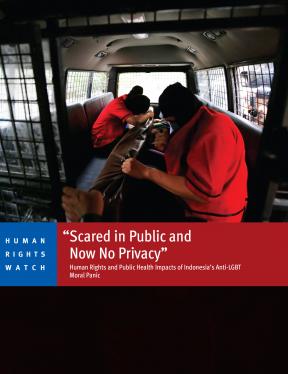Versi Bh. Indonesia
Benjamin Hegarty & Sandeep Nanwani
Indonesia’s capital Jakarta can be a lonely place for young migrants whose financial vulnerability places them in stressful and sometimes dangerous situations. This is an experience that is particularly challenging for young men who have sex with men (MSM). Outreach workers, employed by local NGOs to map out and coordinate a targeted HIV response, play a vital role in connecting young men to lifesaving healthcare in the midst of a worsening epidemic. They play a wide range of other roles for young migrant MSM too, for example, providing much-needed support and solace in popular hangout areas into the early hours of the morning and on Whatsapp 24 hours a day. They also help young men needing care to navigate complex bureaucracies.
In this context, Indonesia’s LGBT moral panic is obscuring and worsening a public health crisis. Since early 2016, a number of politicians have called gender and sexual minorities a threat to the nation, the national psychiatric association has defined LGBT thoughts and behaviours as symptoms of mental illness and, in 2017, the Constitutional Court only narrowly rejected a case which would have criminalised homosexuality. A draft revision to the Indonesian criminal code, set to be passed by parliament in September 2019 but later postponed by President Jokowi after significant protests, would have attached criminal penalties to a vaguely defined concept of cabul (obscenity).
While headline issues involving prominent government ministers and the Constitutional Court attract the attention of the international press, the moral panic has had other sporadic but perhaps more worrying effects. Most recently, police and vigilante groups began to seize packets of unused condoms as evidence of sex work, in one case resulting in the closure of a much-needed NGO in the province of Sumatra.
Although creating a range of problems, including increased police surveillance and the covert criminalisation of same-sex practices, outreach workers continue to be the most important bulwark against the HIV epidemic among MSM in the city. The internationally validated IBBS (Integrated Biological and Behavioral Survey) shows that the proportion of MSM infected with the virus has risen from 5 per cent in 2007 to nearly one in three in major urban areas of Bali and Jakarta. While these statistics reflect more widespread testing, the sheer volume of the increase also suggests the development of a troubling epidemic.

Outreach workers have their work cut out for them: even prior to the LGBT moral panic, young MSM appeared not to be accessing treatment for HIV, despite the increased availability of testing and medication. With the current moral panic their work is harder – and more crucial – than ever. Indonesia’s outreach workers are especially vital because the HIV epidemic is not only a problem of a lack of knowledge about the virus or a lack of condom use. Recent studies suggest that more Indonesians than ever understand what HIV is and how they can prevent infection. Lifesaving medication can be found, theoretically at least, at the smallest of local health clinics throughout Indonesia. In spite of these positive signs, even those who do access medication are dropping out, with only one in three MSM who test positive undertaking continued effective treatment.
Creative care
Given these challenges, creative forms of care and support are crucial for young men, especially poor young migrants new to a city like Jakarta. A lack of networks and precarious living conditions are two reasons why young men with an HIV diagnosis may not go on to obtain treatment. Yet there are success stories; for those who do access treatment and care, outreach workers are saving lives by building new coalitions, sharing bureaucratic know-how and improving their ability to help their peers who have not sought treatment. However, there continue to be groups of young MSM who outreach workers struggle to help access and continue with treatment.
Anecdotally, it appears that young MSM who engage in transactional sex are among the most unlikely to access treatment in the first place, or to continue with it beyond an initial trip to the doctor. This particular group of young men are usually migrants to Jakarta from other parts of Indonesia. This is a complicating factor in a country where health insurance is based on place of birth. These young men frequently engage in a number of different kinds of casual employment and are prone to financial stress. Sudden illness or a change in living conditions can put them at risk of abandoning treatment. A positive diagnosis may also end a young man's career in transactional sex if word gets out about his HIV status.
Outreach workers, who can meet the needs of even the most complex group, are the most valuable element of the response to HIV in Indonesia. Criminalisation is not the answer. It is the efforts of outreach workers in targeting the young MSM population which offer clues for preventing the epidemic from worsening, even in an unsympathetic political context. It is important to bear in mind that their work goes far beyond the provision of condoms and information – they also mobilise scarce resources to arrange for diverse forms of care for their clients.
The breadth of the work done by outreach workers is apparent from even a day or two spent in their company. They have created a do-it-yourself mapping system which locates areas of the city that appear to be undergoing a surge in new HIV infections. They set up booths in malls and look out for MSM, a task for which they say they have a special ability. With a blend of humour and kind-hearted forcefulness, they manage to encourage even the most stubborn or self-conscious MSM to find out if they have the virus and understand the next steps in treatment if needed. This exhaustive work, which often goes unacknowledged, presents one of the few remaining chances to reverse the epidemic.
Despite their best efforts, outreach workers can only do so much. Their work relies on connecting young men to healthcare workers in state-run clinics which have proved to be more effective in moving MSM from testing to treatment than pop-up testing sites in nightclubs or on street corners. Combined with the increased resources made possible by Indonesia’s universal healthcare scheme (BPJS), the relationships between outreach and healthcare workers could be one key to mitigating the risks associated with the LGBT moral panic.
This collaboration between outreach workers and healthcare workers can take on unexpected forms as diverse individuals find themselves taking on crucial roles to combat the epidemic. Outreach workers entering clinics in order to connect young men to care find that their special brand of ngondhek (camp) humour entertains nurses and doctors, resulting in more efficient processes to deal with at-risk patients. Given that these collaborations can already be found throughout the country, they demonstrate the success of creative Indonesian responses that do not rely on punishment and retribution.
Benjamin Hegarty (benjamin.hegarty@anu.edu.au) is an incoming McKenzie Postdoctoral Fellow in the School of Social and Political Sciences at the University of Melbourne. Sandeep Nanwani (nanwani91@gmail.com) is chief medical officer at Yayasan Kebaya in Yogyakarta. The research for the ‘Demographic Dividends’ report was undertaken with a grant from UNAIDS Indonesia, a collaboration by Dr Benjamin Hegarty, Dr Sandeep Nanwani and Dr Yanri Subronto.
